Yalca: the Pony that went to War
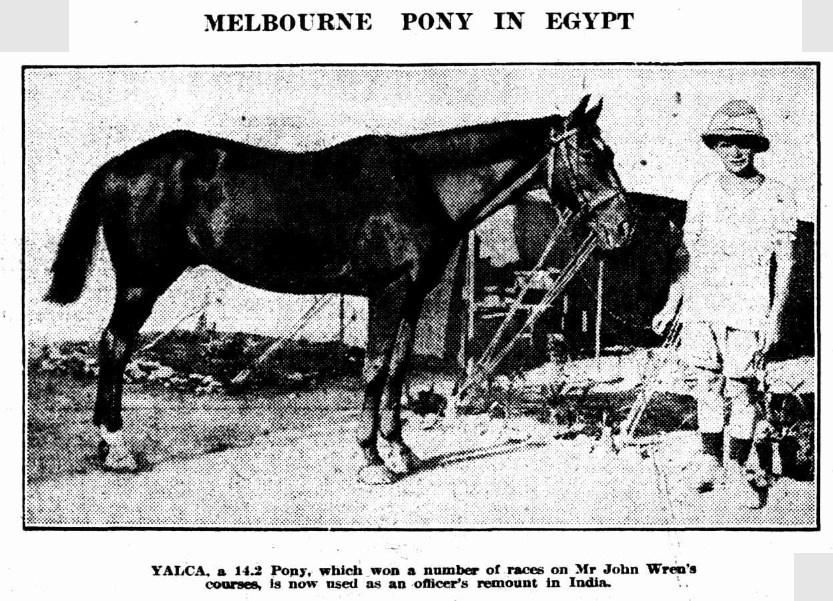
Waler Data Base @ Facebook. Image: Winner (Melb. newspaper), 8th March, 1916
Yalca, the pony that went to war. Thanks for the heads up from Judy Shirley who found him in archives – she sent in the first pic. So looked for his story and here tis…
Images: Herald, 20th September, 1915
Yalca was a champion racing pony – pony racing was huge in those times, gallops. He raced on John Wren’s tracks – Wren had a track in Melbourne, another in Perth, shares in the Belmont track in Sydney and owned another race track in Brisbane. All made him a lot of money. Racing then was seen as a gentleman’s sport but was becoming very corrupt. John Wren set out to clean it up. Often by force! He cleaned up the corrupt trotting racing industry in Melbourne too. This made life much better for the horses and ponies.
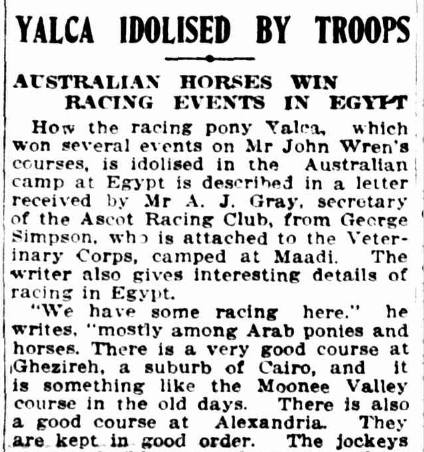
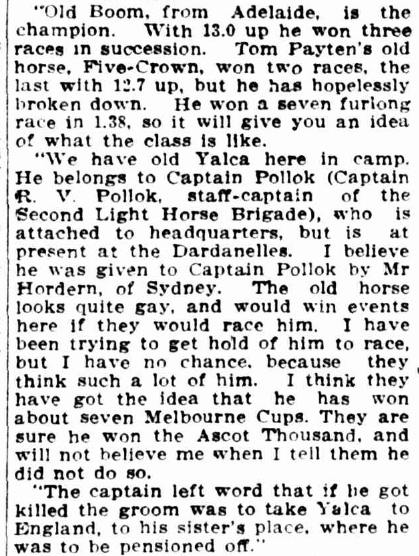
John Wren, a tough Irish Catholic was the first Labor Prime Minister. He also owned at least 31 companies and did philanthropic work with people such as Sir Rupert Clarke, a god to Waler fans.
When war broke out in 1914 Yalca was about to be retired from racing. Many ex race ponies became carriage ponies etc. There was always a sale for a good pony.
Pony races were in height classes of half a hand difference from 13 hands up (there were a few races for 12.2 to 13 hh but not many) – the top height class was 14hh to 14.2hh.
Yalca at 14.2hh was top height. It’s possible he was bred by Anthony Hordern who had a big business in Sydney and who bred and showed many ponies and horses (as Shirley notes: “he was one of the people to help establish the Australian Pony Stud Book Society around 1931 and features in Volume 1 published in 1936 as President of that Society”). He liked finely built showy types. He also raced a few handy ponies including Yalca.
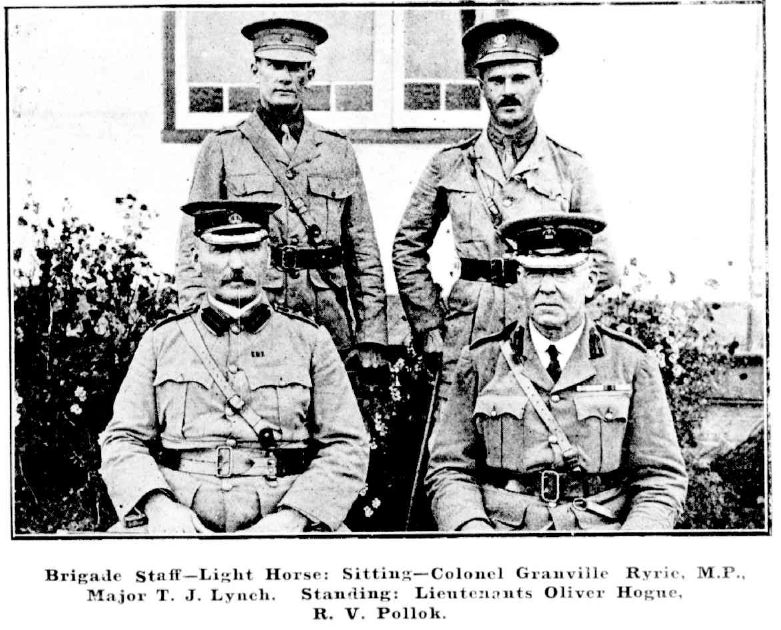
Image: Australian Town & Country Journal, 23rd December 1914
Oliver Hogue is known as Trooper Bluegum (he wrote iconic verse at the war). He, Pollock and Ryrie also served together on Gallipoli, they were all firm friends.
Pollok really loved Yalca, the pony was in the very best hands with him. He must have been a super pony too, to have inspired such confidence and loyalty.
Robert Valentine Pollok, an Irishman, had admired Yalca at the races – Pollok invariably wore a top hat and morning dress to the races, usually being with a VIP party. When he enlisted in 1914, Hordern gave him the pony as Yalca was a stylish officers type with the bonus of being good natured, courageous and tough.
Pollok had been in the King’s Hussars, but joined up here in 1914, having newly migrated. He joined the 6th Light Horse. He went to Egypt with Yalca, and became very attached to the pony and managed to keep the men from racing the pony – some raced their horses hard there from boredom and several of the Thoroughbreds broke down from it. But then Pollok was sent to Gallipoli. He said if he was killed the pony must be sent to England to a country home he’d arranged. He made it through the war but being wounded twice, after recovering was transferred to France without his pony.
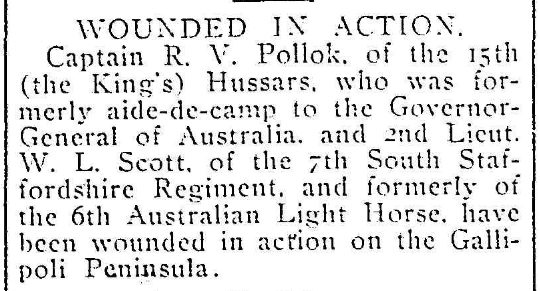
Meanwhile it seems Yalca was given to Captain Ernest N. Woods of the Veterinary Corps, who rode him until the end of the war. There’s mention of a General Riley riding him for a time, this may have been a chaplain, not sure, someone may know. Anyway, he was with Woods at the end of the war, in tip top condition after a lot of campaigning. Probably the usual tragic end.
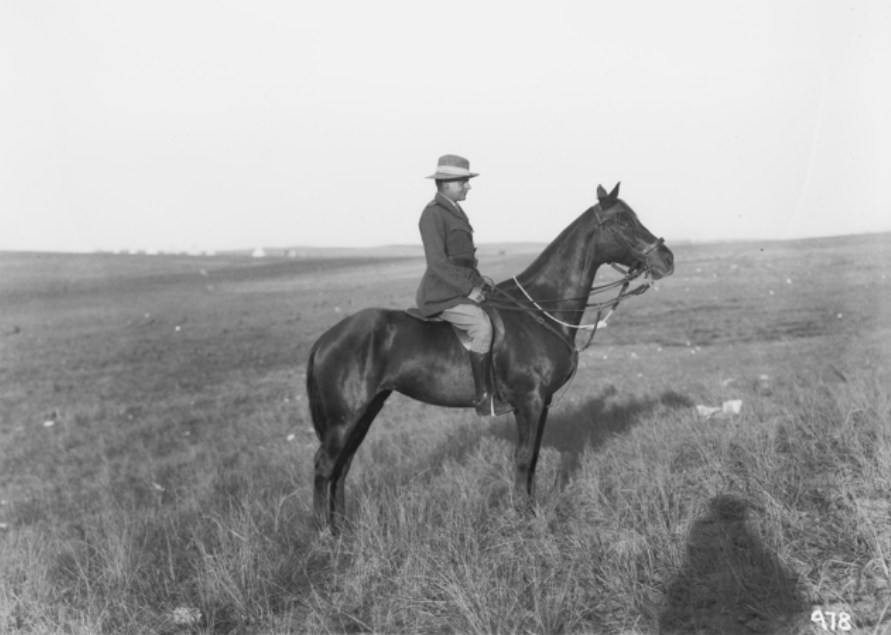
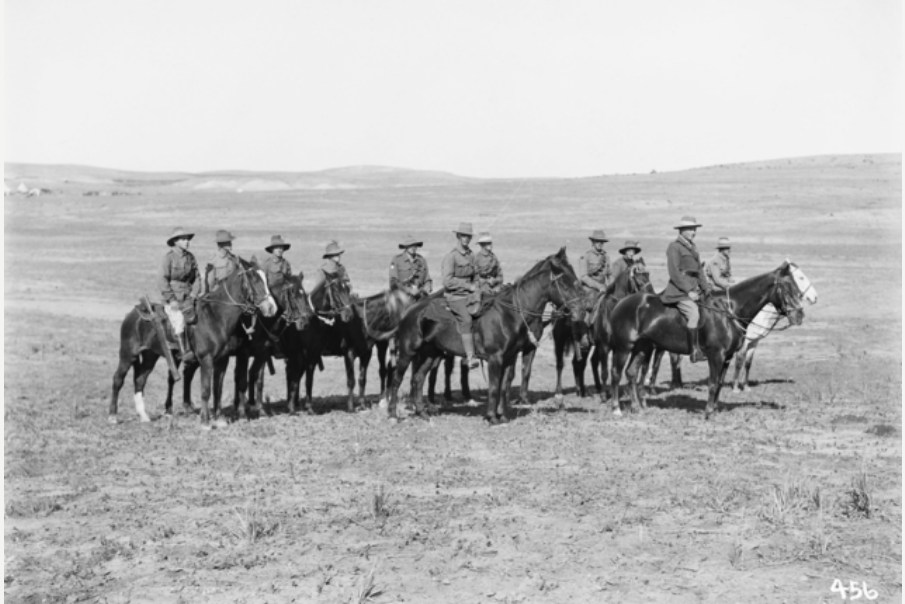
!['A group of officers of the 6th Australian Light Horse Regiment. Identified from left to right: Colonel Colin Dunmore Fuller DSO, Commanding Officer (left) on Illawarra; Major Stuart Archibald Tooth on Dipso; Captain Mackenzie; Captain Abbott; Chaplain Captain Mailley [sp?]; Captain Ernest Nonus Wood, AVC on Cluney [?Clunie]. November 1918. Rishon, Palestine.' AWM](https://walerdatabase.online/wp-content/uploads/2024/05/Yalca-in-group.jpg)
AWM Images: Mobile ‘Vets’ of the 2nd Australian Light Horse Brigade. The eleven veterinarians are mounted on their horses with Captain Woods, Brigade Veterinary Officer, second from right. November 1918. Rishon, Palestine; A group of officers of the 6th Australian Light Horse Regiment. Identified from left to right: Colonel Colin Dunmore Fuller DSO, Commanding Officer (left) on Illawarra; Major Stuart Archibald Tooth on Dipso; Captain Mackenzie; Captain Abbott; Chaplain Captain Mailley [sp?]; Captain Ernest Nonus Wood, AVC on Cluney [?Clunie]. November 1918. Rishon, Palestine. (Looks to me like Yalca that Woods is on despite the name in caption.)
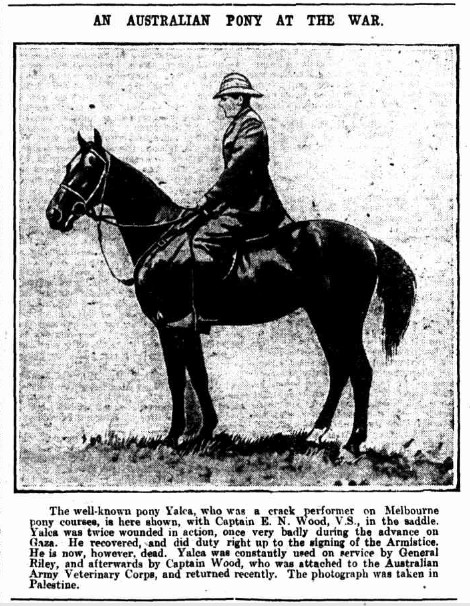
Image: The Australasian, 20th April 1919
Valentine Pollok wanted Yalca sent to England to a good country home he’d arranged after the war. However, in this clipping he says he died at the end of the war. It’s probable, being with the vet corps who had to assess horses, that being over 12 years old, he was shot. A shame they didn’t honour Pollok’s wishes. Perhaps no-one had the money. There is the possibility he was indeed sent to England as several horses made their way there mysteriously, cleverly avoiding various quarantine stops, so couldn’t be make known and their name was usually changed once in England. Am not sure if Palestine to England was a quarantine situation or not. Someone may know?
Image: Sunday Times, 24th September 1916
Archbishop Riley of Perth, was made Chaplain-General and went to the front in the Middle East. He also travelled to France and the UK. Was this the General Riley who rode Yalca for a time?
I can’t find General Riley who is mentioned in one newspaper caption (which may of course be in error) so someone may know, thank you…
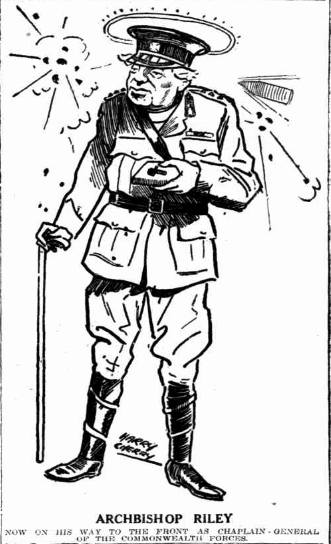
Ponies weren’t accepted by the army, this is only the third one I’ve found going to the war, however as it was privately owned and by an officer, a blind eye was turned to his height. What a champion indeed, thank you Yalca, and to Judy for finding you.